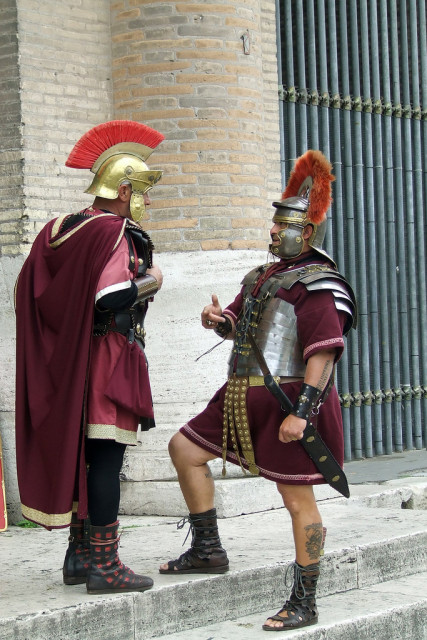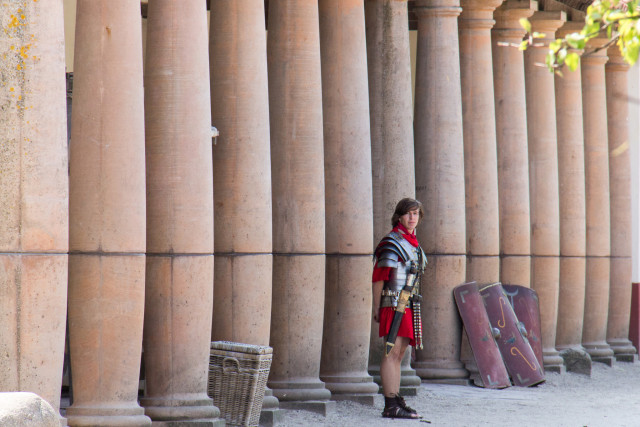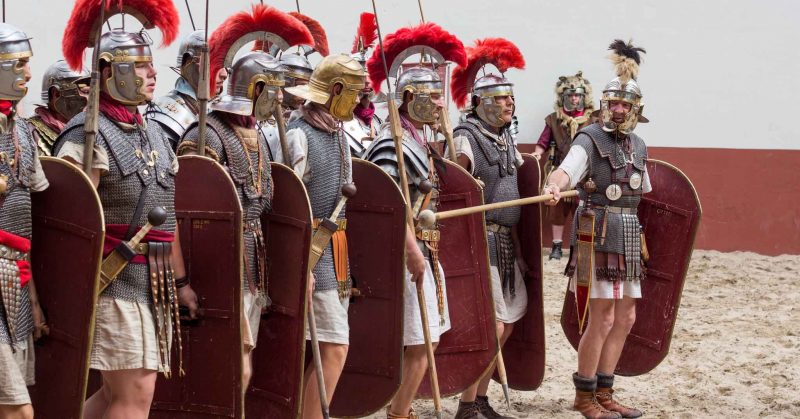Though it originally began purely as a war machine, the Roman army evolved to fill other roles. This was an inevitable outcome of the growth of the empire. As Roman territory spread under the late Republic and early emperors, more soldiers had to be kept on the books, ready to defend existing territory or push beyond it as the opportunity arose. Something had to be done with all these men when they weren’t fighting.
There was already a blurred line between military and civilian roles in the upper class. The senators, Rome’s aristocrats, tended to have careers that mixed military command with political positions. The most senior posts available to them, such as that of a provincial governor, included both military and civilian duties. So it was only natural that they would make use of the soldiers serving under them for civilian as well as military work.
The Legionary as Administrator
As both military and civilian commanders, governors drew their staff from the ranks of the legions. A praetorium, the headquarters of a governor, was essentially a military affair. All of the staff there were taken from armed units under the governor’s command, detached from their usual units to serve under the most senior commander in the region.
Some of these men still had quasi-military roles, such as bodyguards for the governor and his senior staff. But many, more acted as various kinds of administrators. There were cornicularii (clerks) who oversaw the smooth running of the administration. Exceptores and notarii, men filling roles similar to what we now think of as a secretary. Exacti and librarii kept track of growing archives of documents and kept the books. Commentarienses made and maintained records of what was going on in the province. There were assistants in the form of adiutores. At the top of the heap were more senior positions with titles such as beneficiarii, frumentarii and speculatores, all part of the bureaucratic machine.

Officers in charge of local garrisons also acted as administrators. The representatives of Rome in their local areas, they were a natural point of contact for locals, and natural choices for their superiors to turn to when anything needed to be organized. As a result, they were involved in work such as gathering census reports, playing the role of the local bureaucrat.
The Legionary as Builder
The Roman way of war relied heavily on men with the skills needed for building projects. There were specialists such as the engineers who created siege machines and the architects who oversaw the construction of siege works. There were also craftsmen who had plied another trade before joining the legions, or who had developed practical skills while carrying out work on military construction projects.
Even when not undertaking a siege, life on a campaign was full of construction. A Roman legion on the march would build a defended camp every night, digging ditches and using the earth to build ramparts. The business of getting an army from one place to another meant a lot of construction.
It was, therefore, natural that legionaries would be used for large-scale construction projects even when these could have been done by civilians. Hadrian’s Wall was built by the three legions stationed in Britain at the time – II Augusta, VI Victrix and XX Valeria Victrix. As in battle, the unit structure of the legions came in handy here, with the work being split into parts that could each be assigned to a century.
Road construction was also sometimes legionary work. It provided better transport networks when the military needed them, as well as helping with the civilian economy. And there were projects of purely civilian purpose, such as restoring the aqueduct at Caesarea Maritima in Judea or digging a canal near Antioch. The legions had the skills and manpower to make these projects a reality.
The Legionary as Manufacturer
Like construction work, the industrial role of the legions arose from their military needs. Workshops were a common feature of large military camps, as they allowed weapons and armor to be produced and maintained. This meant that men in the legion had to have the skills to work the forges.
Similarly, the legions needed cooking vessels. Like the tiles used in constructing permanent barracks buildings, there were produced in potteries owned and staffed by the legions. Tiles stamped with the mark of military units have been found on civilian sites, indicating that they weren’t just used by the military.
It was natural for the army to supervise sites such as the lead mines of hazardous western Britain or the quarries from which the legions took their stone. Sometimes a governor would even use soldiers for the hard labor of mining, as when Curtius Rufus had soldiers in Upper Germany mine for silver, a scheme whose profits earned the governor high honors from the emperor.
The Legionary as Policeman

In any era, policing relies upon the threat of violence, whether implied or explicitly stated. It’s the right to use force to keep criminals in check that gives the police their power even in the most civilised of societies.
In ancient Rome, as in most societies before the 19th century, there was no separate police force. Instead, the legions were responsible for upholding law and order.
Often, their mere presence was enough to keep people safe. Small garrisons stationed along major travel routes could deter bandits, allowing merchants and messengers to pass in peace. This dispersed policing role explains how soldiers so often found themselves spread across the provinces and so becoming local administrators.
The way these two roles came together is shown in the appeals made by victims of crime to the local legions. Egyptian papyri record many occasions when people appealed to local officers to investigate and punish the perpetrators of thefts, assaults, and threats.
